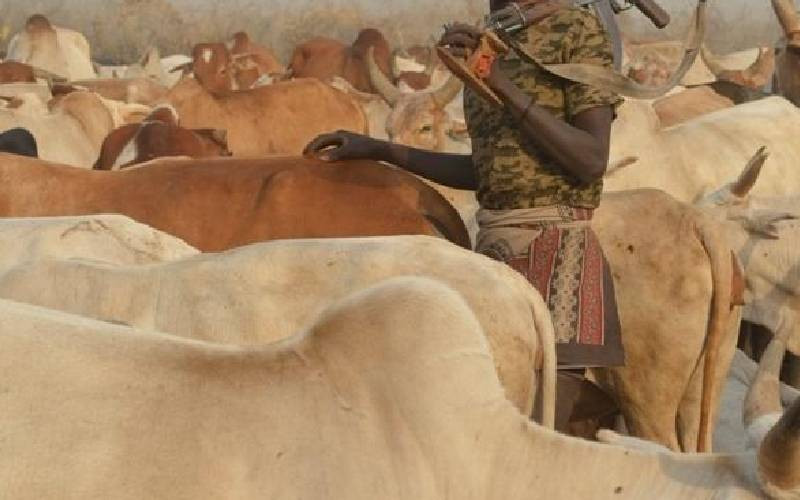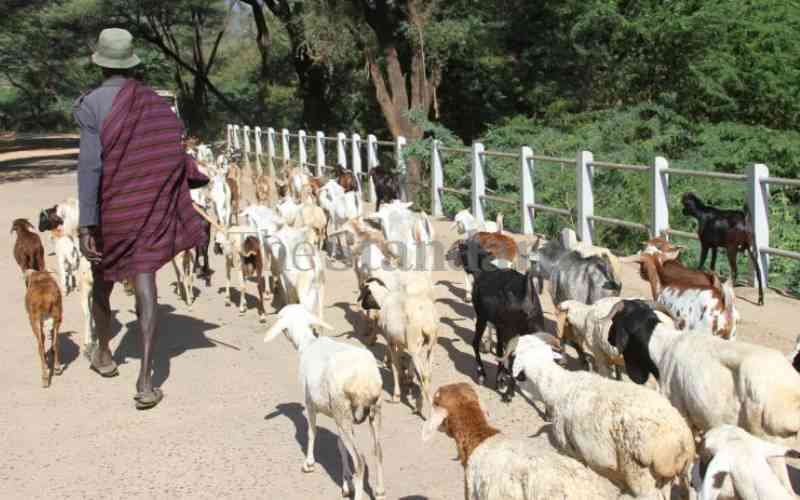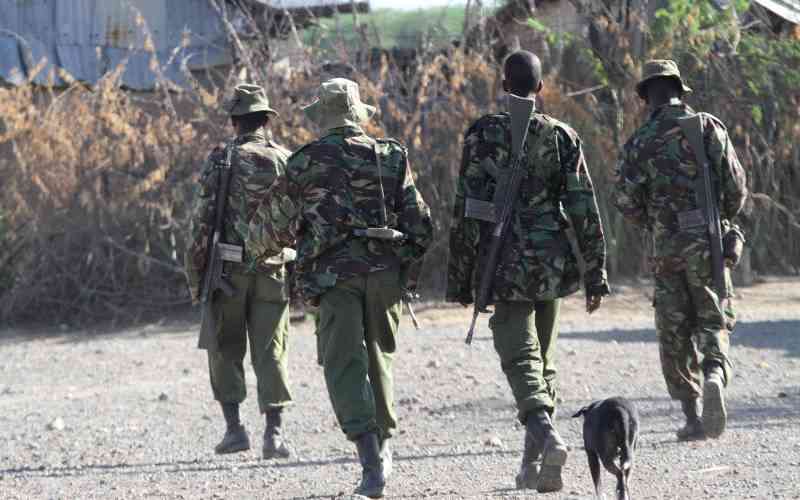 |
|
Residents of Lochwaa location in Lokichar sub-county wait patiently under a tree to be addressed by their leaders last week. Turkana residents have complained of being sidelined in the oil mining industry. |
LODWAR, KENYA: Isaac Lukasi’s hope for oil boom is slowly turning into gloom. And as he stares at the horizon as the sun sets, he knows the dimming sun rays will give way to an insecure night of possible raid by bandits in Turkana’s Nakukulus village.
“They steal our animals at will,” Lukasi says referring to the frequent raids by neighbouring Pokot community.
“We thought the discovery of oil would bring development to our community and with it security, now that seems like a mirage,” Lukasi adds, gazing at a herd of grazing goats nearby.
Equally illusive, or so it seems, is the promise of goodies in exchange for Turkana land, their labour and hospitality.
The community of about 2,000 people is now crammed in an area of less than 250 metres radius, fenced off by barbed wire and thorns after giving up their ancestral land for oil prospecting.
A gravelled road leads to Ngamia-1 drilling site owned by Tullow Oil Plc but ends just as you enter Nakukulus village, 40km south-west of Lokichar town, off the main Kapenguruia-Lodwar road. By now, one would expect to see mushrooming modern infrastructure like shopping centres, schools and hospitals as the oil rush catches on. In contrast, however, all you see over this stretch is expansive scorched earth and forlorn manyattas.
“There have been roads yes, but they only lead to the oil installments, the rest of the villages have been ignored,” says Lukasi.
“As for schools, that is what they can show for it,” he says pointing at a two-roomed structure tucked away at the far left corner of the village.
The classrooms, which have no doors or windows, caters for about 150 children from the community but there is no teacher. Learners who have completed Standard Eight and Form Four have volunteered to teach the children — for free.
There is a borehole a few metres from Ngamia-I and another one 25km away toward neighbouring Lokichada village. The company and the two villages share the wells for all their water needs, which is hardly enough, according to the villagers.
According to village elder Joseph Loposi, only six people from the village have been employed in the oil industry as casual labourers and earn a paltry Sh3,000 per month.
He says the company had also promised to build them houses and provide bursaries for school-going children — which have not materialised.
BIASED EMPLOYMENT
“Even getting a casual job is as hard as squeezing water out of a stone. There are no criteria in hiring and the process has been hijacked by politicians, supervisors and their cronies who demand as much as Sh5,000 before one can be considered,” says Esther Ayama, a 19-year-old woman who worked in the oil mines for a month as casual labourer.
Incredibly, the company pays 12 women and four men Sh15,000 each per month to guard the gravelled road leading to Twiga-1 drilling site, about 35km from Ngamia-1. Much as the money is more than reasonable by local standards, but some locals find the engagement ridiculous and insulting to the community.
Stay informed. Subscribe to our newsletter
“I do not mind the money, but the job is tough and degrading. Imagine just standing by the roadside the whole day from 6am to 6pm doing nothing,” says a woman who only identified herself as Ebur.
The Standard later learnt that the work of the “road watchers” is to prevent un-authorised vehicles from accessing the site where the company prospects for oil. But the road watchers did not stop the vehicle used by our crew.
The disillusionment runs through the area, but for 75-year-old Engumo Arega, head of midwives at Ngakommna village North-East of Ngamia-I, all that concerns her is the high maternal mortality in the area.
Asked about how soon she expected the oil goodies to start trickling in, Arega replies: “As soon as the oil was out of the ground. But they got it out of the ground a year ago, I was reliably informed, but I’m still waiting for the benefits. Now I hear it will not be until another six years.”
Such was the high expectation among the Turkana that when the goodies delayed — or never arrived at all — the feelings changed to a mixture of frustration and anger.
Just last week, there was pandemonium at one of Tullow sub-contracted companies at Ngamia-1 in Turkana South after workers went on the rampage. The Ardan Company workers, from Turkana Community, were protesting against unfair practices in the oil fields.
But Tullow says it has met most of its obligations to the community.
“Our unprecedented exploration success in Kenya in the South Lokichar Basin has been accompanied by substantial social investment that has had a positive impact for communities across the county,” says Rob Gerrits, Tullow Kenya social performance manager.
“In 2013, the company initiated the Turkana Education Programme, which supports needy students through bursaries and provision of text books,” says Gerrits.
“Through this programme, Tullow has invested Sh24 million which has seen over 3,000 students benefit from the local bursary programmes,” he adds.
However, Turkana South MP James Lomenen says the company needs to do more.
He says the company needs to empower the people to participate effectively in the industry by developing their capacities to deliver some of the services provide.
“We recognise that oil drilling is a highly technical operation, but surely must you outsource services like the supply of charcoal?” poses the MP.
The MP was reacting to speculation that Tullow had contracted a company based in Nairobi to supply charcoal, which is abundant in Turkana.
The company allegedly buys the commodity from Lokichar in Turkana, transports it to Kitale before ferrying it back to Tullow.
“We are also concerned that the company has hired a company from Kitale to supply it with meat products yet Turkana South has so many animals,” Lomenen says.
According to Jackson Nakusa, a member of the Turkana Professional Association, the concerns being raised can be resolved amicably.
“Things are improving but the company needs to do more. Apparently, at first, Tullow did not realise some of the contracted companies were not following the laid down procedures such as on employment and contracts, but after a series of consultations between the company and local stakeholders, they are now putting their house in order,” he says.
He says locals are starting to get job and business opportunities like providing transport services through light-vehicle hiring scheme, where the company can hire vehicles from local companies or individuals.
 The Standard Group Plc is a
multi-media organization with investments in media platforms spanning newspaper
print operations, television, radio broadcasting, digital and online services. The
Standard Group is recognized as a leading multi-media house in Kenya with a key
influence in matters of national and international interest.
The Standard Group Plc is a
multi-media organization with investments in media platforms spanning newspaper
print operations, television, radio broadcasting, digital and online services. The
Standard Group is recognized as a leading multi-media house in Kenya with a key
influence in matters of national and international interest.
 The Standard Group Plc is a
multi-media organization with investments in media platforms spanning newspaper
print operations, television, radio broadcasting, digital and online services. The
Standard Group is recognized as a leading multi-media house in Kenya with a key
influence in matters of national and international interest.
The Standard Group Plc is a
multi-media organization with investments in media platforms spanning newspaper
print operations, television, radio broadcasting, digital and online services. The
Standard Group is recognized as a leading multi-media house in Kenya with a key
influence in matters of national and international interest.









